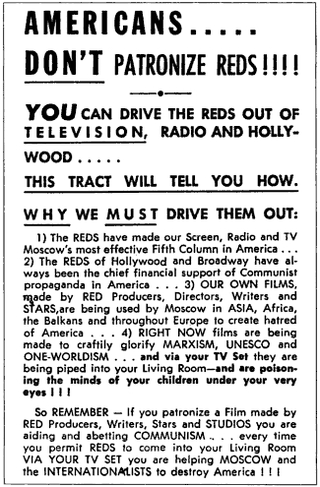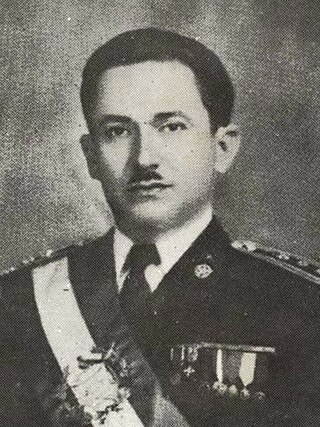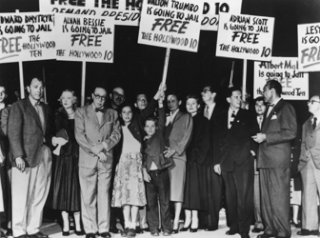Related Research Articles

McCarthyism, also known as the Second Red Scare, was the political repression and persecution of left-wing individuals and a campaign spreading fear of communist and Soviet influence on American institutions and of Soviet espionage in the United States during the late 1940s through the 1950s. After the mid-1950s, U.S. Senator Joseph McCarthy, who had spearheaded the campaign, gradually lost his public popularity and credibility after several of his accusations were found to be false. The U.S. Supreme Court under Chief Justice Earl Warren made a series of rulings on civil and political rights that overturned several key laws and legislative directives, and helped bring an end to the Second Red Scare. Historians have suggested since the 1980s that as McCarthy's involvement was less central than that of others, a different and more accurate term should be used instead that more accurately conveys the breadth of the phenomenon, and that the term McCarthyism is, in the modern day, outdated. Ellen Schrecker has suggested that Hooverism, after FBI Head J. Edgar Hoover, is more appropriate.

Juan Jacobo Árbenz Guzmán was a Guatemalan military officer and politician who served as the 25th president of Guatemala. He was Minister of National Defense from 1944 to 1950, before he became the second democratically elected President of Guatemala, from 1951 to 1954. He was a major figure in the ten-year Guatemalan Revolution, which represented some of the few years of representative democracy in Guatemalan history. The landmark program of agrarian reform Árbenz enacted as president was very influential across Latin America.
A Red Scare is a form of moral panic provoked by fear of the rise, supposed or real, of leftist ideologies in a society, especially communism. Historically, "red scares" have led to mass political persecution, scapegoating, and the ousting of those in government positions who have had connections with left-wing to far-left ideology. The name is derived from the red flag, a common symbol of communism.

Carlos Castillo Armas was a Guatemalan military officer and politician who was the 28th president of Guatemala, serving from 1954 to 1957 after taking power in a coup d'état. A member of the right-wing National Liberation Movement (MLN) party, his authoritarian government was closely allied with the United States.

The 1954 Guatemalan coup d'état deposed the democratically elected Guatemalan President Jacobo Árbenz and marked the end of the Guatemalan Revolution. The coup installed the military dictatorship of Carlos Castillo Armas, the first in a series of U.S.-backed authoritarian rulers in Guatemala. The coup was largely the result of a CIA covert operation code-named PBSuccess.

Julio César Méndez Montenegro was a Guatemalan academic who served as the 34th president of Guatemala from July 1966 to July 1970. Mendez was elected on a platform promising democratic reforms and the curtailment of military power. The only civilian to occupy Guatemala's presidency during the long period of military rule between 1954 and 1986. Nevertheless, his election and swearing in was considered a major turning point for the long military-led Guatemala. He was the first cousin of César Montenegro Paniagua whose kidnapping, torture and murder during the Julio César Méndez presidency is rumored to have been undertaken with presidential sanction.
Decree 900, also known as the Agrarian Reform Law, was a Guatemalan land-reform law passed on June 17, 1952, during the Guatemalan Revolution. The law was introduced by President Jacobo Árbenz Guzmán and passed by the Guatemalan Congress. It redistributed unused land greater than 90 hectares in area to local peasants, compensating landowners with government bonds. Land from at most 1,700 estates was redistributed to about 500,000 individuals—one-sixth of the country's population. The goal of the legislation was to move Guatemala's economy from pseudo-feudalism into capitalism. Although in force for only eighteen months, the law had a major effect on the Guatemalan land-reform movement.

Communist Party of Honduras was a communist party in Honduras. PCH was refounded on October 10, 1954 by Ramos Dionisio Bejarano and Rigoberto Padilla Rush. It had its roots in the Honduran Revolutionary Democratic Party. From the beginning, he maintained a strong presence in the workers union movement, especially the banana movement against the UFCO activities in Honduras.
The National Committee of Defense Against Communism was a committee formed on 19 July 1954 in Guatemala by president Carlos Castillo at the request of the United States Central Intelligence Agency. The Committee's primary goal was to fight alleged threats to the government of Guatemala by persons the Committee named as Communist subversives.
Communist crimes is a legal definition used in the Polish Penal Code. The concept of a communist crime is also used more broadly internationally, and is employed by human rights non-governmental organizations as well as government agencies such as the Unitas Foundation, the Institute for Information on the Crimes of Communism, the Institute for the Study of Totalitarian Regimes, the Institute for the Investigation of Communist Crimes in Romania, and the Office for the Documentation and the Investigation of the Crimes of Communism.
Martin Gang was an American lawyer. Gang was a graduate of Harvard and the Boalt Law School, and was known for providing legal aid to victims of the 1940s and 1950s Hollywood blacklist. Martin Gang was involved in the founding of the American law firm now known as Gang, Tyre, Ramer, Brown & Passman, Inc., and remained within the firm from 1931 to his death.
Operation PBHistory was a covert operation carried out in Guatemala by the United States Central Intelligence Agency (CIA). It followed Operation PBSuccess, which led to the overthrow of Guatemalan President Jacobo Árbenz in June 1954 and ended the Guatemalan Revolution. PBHistory attempted to use documents left behind by Árbenz's government and by organizations related to the communist Guatemalan Party of Labor to demonstrate that the Guatemalan government had been under the influence of the Soviet Union, and to use those documents to obtain further intelligence that would be useful to US intelligence agencies. It was an effort to justify the overthrow of the elected Guatemalan government in response to the negative international reactions to PBSuccess. The CIA also hoped to improve its intelligence resources about communist parties in Latin America, a subject on which it had little information.
The U.S. Central Intelligence Agency (CIA) has a history of interference in the government of Guatemala over the course of several decades. Guatemala is bordered by the North Pacific Ocean and the Gulf of Honduras. The four bordering countries are Mexico, El Salvador, Honduras and Belize. Due to the proximity of Guatemala to the United States, the fear of the Soviet Union creating a beachhead in Guatemala created panic in the United States government during the Cold War. In an interview, Howard Hunt, CIA Chief, Mexico, stated that "We were faced here with the obvious intervention of a foreign power, because these home grown parties, are not really home grown, they are being funded...or advised by a foreign power, i.e. the Soviet Union." The CIA undertook Operation PBSuccess to overthrow the democratically elected Jacobo Árbenz in the 1954 Guatemalan coup d'état. Carlos Castillo Armas replaced him as a military dictator. Guatemala was subsequently ruled by a series of military dictatorships for decades.

Capital punishment in Romania was abolished in 1990, and has been prohibited by the Constitution of Romania since 1991.

The Hollywood blacklist refers to the mid-20th century banning of suspected Communists from working in the United States entertainment industry. The blacklist began at the onset of the Cold War and Red Scare, and affected entertainment production in Hollywood, New York, and elsewhere. Actors, screenwriters, directors, musicians, and other professionals were barred from employment based on their present or past membership in, alleged membership in, or perceived sympathy with the Communist Party USA (CPUSA), or on the basis of their refusal to assist Congressional or FBI investigations into the Party's activities.
The Decree Against Communism was a 1949 Catholic Church document issued by the Supreme Sacred Congregation of the Holy Office, and approved by Pope Pius XII, which declared Catholics who professed atheistic communist doctrine to be excommunicated as apostates from the Christian faith. The decree has since been abrogated, and is no longer valid.
The National Anti-Communist Front was a coalition of the anti-communist parties and groups that supported Carlos Castillo Armas. Its program envisioned economic and social reforms for the development of Guatemala and the elimination of communist infiltration. Its members included the Anti-Communist Unification Party (PUA), Independent Anti-Communist Party of the West (PIACO), Anti-Communist University Students Committee (CEUA), Comités como el Cívico Independiente, Obrero Anticomunista, Femenino Anticomunista, de Locatarias, Asociación Juvenil Anticomunista, among others. In 1955, most member organizations were involved in the establishment of the National Democratic Movement (MDN).
The Independent Anti-Communist Party of the West was a Guatemalan right-wing party founded in 1953. Led by Inez Nuño, it was the leading anti-Communist party in the Western part of Guatemala. PIACO fought against the government of Jacobo Arbenz Guzmán. After the coup in 1954, it supported the government of Carlos Castillo Armas, and subsequently collaborated with Ydígoras Fuentes.

Counterattack was a weekly subscription-based newsletter published from 1947 to 1955, with an emphasis on anti-communist content and organizing boycotts or other actions against those who were accused of communist associations or sympathies. The mimeographed newsletter was published by American Business Consultants, a "private, independent organization" started by three former agents of the Federal Bureau of Investigation. Counterattack went into decline after a series of lawsuits by people who were named in the publication.
The Fund for the Republic (1951–1959) was an organization created by the Ford Foundation and dedicated to protecting freedom of speech and other civil liberties in the United States. In 1959, the Fund moved from New York City to Santa Barbara, California, and changed its name to the Center for the Study of Democratic Institutions (CSDI).
References
- ↑ Hey, Hilde (1995). Gross Human Rights Violations: A Search for Causes : A Study of Guatemala and Costa Rica. The Hague, The Netherlands: Martinus Nijhoff Publishers (Klower Law International). p. 34. ISBN 978-90-411-0146-4.